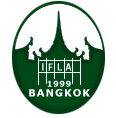   
 65th IFLA Council and General
Conference
Bangkok, Thailand, August 20 - August 28, 1999
The Value of Traditions in the 21st Century
The Honourable Professor John D. Waiko,
Vice Minister of Education, Science and Culture, Papua New Guinea
Abstract:
Oral tradition consists of a spoken word both tangible and intangible:
and it is as old as the humankind itself whereas the invention of writing system
is a relatively recent phenomenon. Most scholars of the nineteenth century cast
doubts on the validity of oral transmission and its transmission from one
generation to another.
Many scholars of the twentieth century developed methods of analysis to
arrive at an acceptable basis of the historical value arising from oral sources.
In the next millennium, many people may regard the oral tradition as a fountain
of cultural values from which national and regional identities flow - kind of a
data bank for the common heritage of humanity.
There are voluminous literature available on the theoretical questions and
the methodological problems concerning oral traditions which the author wish not
to indulge himself. He confines himself by presenting a brief background on
Papua New Guinea. The address starts with the author's personal observations on
some aspects of the Conference Theme: Collecting and Safeguarding Oral
Traditions in so far as the country is concerned.
The second part relates to living human and material treasures including
oral traditions in order to provide an insight into and an example of cultural
diversity in Papua New Guinea. The third part contends with the apparent
tension between traditions in general and modern education in particular. How,
for instance, is it possible to adopt oral traditions and adapt to change
without turning one's back on the cultural diversity? How can cultural
competence be acuired to complement new skills and how can scientific progress
be assimilated? This is the context in which the challenges of the new
information technologies must be integrated in the national education system
in the next millennium. The address ends with a conclusion.
| 
